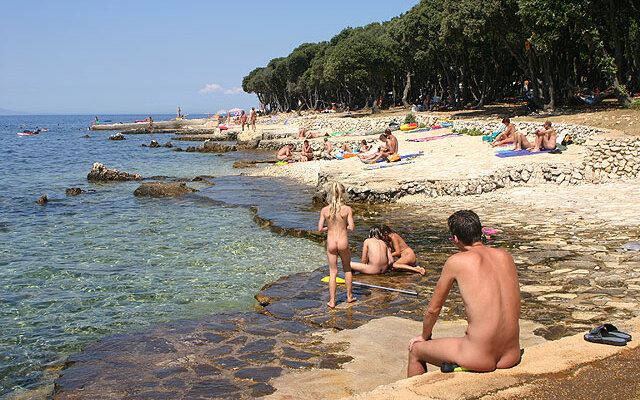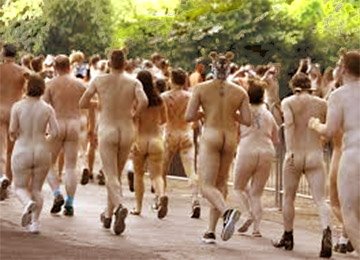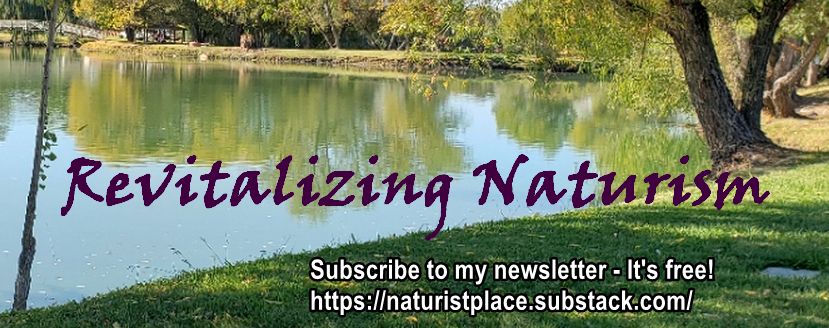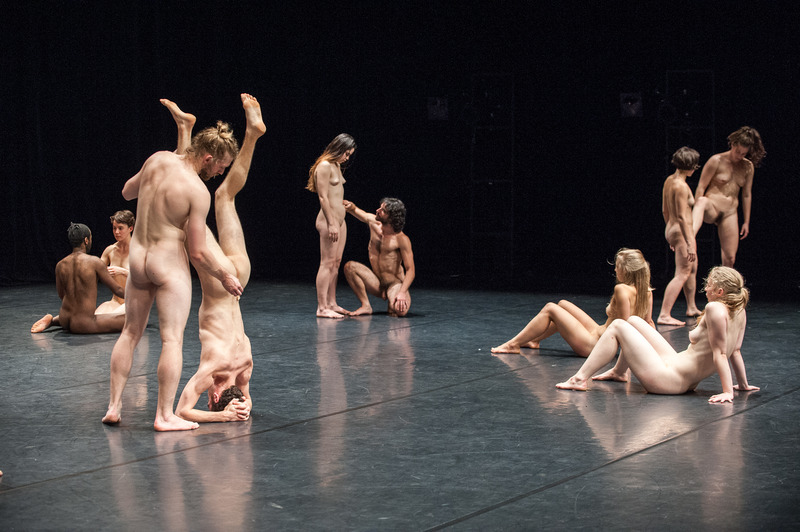- Naked dance performance – Doris Uhlich
Doris Uhlich is a dancer and choreographer based in Austria. According to her website, she
“has developed her own projects since 2006. The choreographer’s work frequently focuses on examining everyday gestures but also artificial ones, such as the strict code of movement of classical ballet in SPITZE (2008) and Come Back (2012). All her performances are investigations into beauty ideals and standards of body image, as in her piece mehr als genug (2009). Since her performance more than naked (2013), Doris Uhlich has also been working on the depiction of nudity free from ideology and provocation.”There’s a long tradition of nudity in theatrical performances. Consider Isadora Duncan (1877-1927), for instance, who’s credited with being “the creator of modern dance”. Another article (Nude Vibrations: Isadora Duncan’s Creatural Aesthetic) states that Duncan “insists upon the human harnessing of earthly vibrations, the value of nudity and barefootedness”. Doris Uhlich has certainly carried on that philosophy.
Since 1969, full nudity in theatrical productions has less often received attention in choreography than in dramatic productions and musicals, such as Oh! Calcutta! (which did incorporate segments of ballet and interpretive dance). Uhlich’s work occupies an extensive space between theater and pure dance – but plays a much more essential role in the latter, where spoken dialog is absent.
- Doris Uhlich: Projects
- More than naked chords rediscovered (Portuguese, with English translation)
- More than naked, accords retrouvés (French)
- Naturists visit a Paris film library

In the past 20 years there have been a few occasions when museums have had special events – by reservation only – for an evening or two when visitors are able to be naked. In fact, nudity is usually required. (Shoes may be mandatory or not, depending on local regulations.) Mostly such events have been in Paris – as in the present instance – but a few have taken place in Austria, Italy, Australia, and elsewhere. It would be a well-kept secret if there have been any in the nudity-phobic U. S. Perhaps naturists in the States just aren’t too interested in “high-brow” events of this sort.
According to the first article cited below, “Parisian nudists descended upon the city’s film library on September 13 for an exhibition celebrating a famous French comedian. With COVID-19 protection measures in place, the only mandatory accessory was a mask. The Association des Naturistes de Paris (Paris naturist association) organised the event at La Cinémathèque. … The Paris naturist association has organized regular visits to museums.”
- How looking at myself naked in the mirror empowered me

Most people cringe, at least to some extent, when looking closely at themselves fully naked in a mirror. Partly this is because what they notice is the various ways their bodies fail to be “perfect”. Even though they realize that hardly any bodies actually qualify as “perfect”. But most people probably feel the same way about only their faces. Why else would they be so concerned with having their makeup “just right” (if female) or their facial hair exactly projecting a desired image (if male)?Another aspect of this is the social conditioning people from a young age feel that there’s something inherently wrong with full nudity itself, that paying too much attention to “private parts” – even one’s own – just isn’t acceptable.
Is it any wonder, then, that most people dread the thought of their naked body being fully exposed to the scrutiny of others – especially strangers?
The article here explains why overcoming these attitudes is so important, and why seeing yourself naked in the mirror is a big help. Although it’s written from a woman’s perspective, much of it is relevant to men as well. Here are some key points, in the writer’s own words:
- Watching myself naked in the mirror was the start of my empowering journey with my body.
- I felt like a strong and independent woman who was ready to take over the world.
- I had learned to stand up for myself, to not believe in what others were trying to make me believe.
- I had found renewed self-confidence in the mirror glaring right back at me, making full eye contact.
- Once you accept and own your own vulnerabilities, there is really nothing that someone else can point out to you which will make you see yourself differently.
- Looking at myself naked every day makes me feel more comfortable in my skin every day.
- Looking at myself naked in the mirror has given me the power to know myself deeply. It has given me the power to ignore what others say about me and to make a move forward.
A key step to fully enjoying naturism is getting very comfortable with the appearance of your naked body just as it is. That doesn’t mean you can’t choose to work on “improving” your appearance – in your own opinion – if you so desire. - Naturism during lockdown
Probably the most common story about naturism in 2020 is how well naturists have coped with the Covid pandemic. This wasn’t, intuitively, to be expected, since naturism is inherently a social thing – and in-person socializing is severely constrained by the pandemic. Nevertheless, naturist organizations in various countries have reported surges in membership.There are several articles cited here about this counter-intuitive phenomenon. Here’s another one: ‘There’s nothing weird about being naked’: Inside the lockdown naturism boom. It says that, for example, a spokesperson for British Naturism claimed “The organisation has seen a 400 per cent increase in members since the start of lockdown, rising from 184 to 930 new members since the day restrictions were announced.” The article goes on to offer several anecdotal accounts of how people who are deprived of other sources of enjoyment – and have unexpected free time on their hands – have discovered the significant pleasure of simply being naked.
Another article (One Way People Are Dealing With the Constraints of Lockdown: Being Naked) delves somewhat more deeply into reasons that more people have discovered the pleasures of nakedness and naturism while mostly confined at home. What it boils down to is that confinement at home allows for dispensing with clothes – thus avoiding the trouble of deciding what to wear, getting dressed, and washing clothes that have been worn. Choosing to be naked directly confers additional benefits.
- Going naked allows people to become more aware of their own body, to get used to seeing parts of their body that clothes generally cover, and to become familiar with the overall appearance of their naked body.
- Limitations on where it’s possible to go causes frustration. Frequent nudity has mental health benefits to offset that, since familiarity with one’s naked appearance leads to increased body acceptance, self-confidence, and feeling empowered. (See the article above about looking at oneself naked in a mirror.)
- There are also physical health benefits from eliminating the restrictions of clothes, such as lack of discomfort and skin irritation caused by clothing, freedom for the skin to breathe and evaporate sweat, and improved blood circulation.
- The very pleasurable feeling of total nudity contributes directly to overall happiness and enjoyment of life.
- Wearing nothing while living with others who may also be clothesfree makes being seen naked and seeing others naked become considered normal and unobjectionable.
- Types of healthful fitness activities – such as yoga and using exercise equipment – are easier and more natural without restrictive clothes.
- Europe’s best nude beaches

People interested in finding the “best” experience of almost anything to be had for a limited amount of time, money, and effort naturally seek out advice from reliable sources. Understandably, when you want to visit a clothing-optional beach, you’d like to know which of the possibilities have the nicest sand, friendly people, easy access, good swimming, and so on.Many lists of “best beaches” consist mainly of subjective opinions of writers who may or may not have criteria similar to yours. OnBuy – a UK online shopping site that claims to be “UK’s most trusted marketplace” – took a somewhat more systematic approach. In early September they consulted Google reviews for 50 European clothing-optional beaches that garnered at least 200 comments. The data was then summarized by averaging the number of “stars” in each review to single out the 10 beaches having the highest average rating. The results are here.
Spain’s Playa de Ses Illetes beach on the island of Formentera came out on top, with an average of 4.8 stars out of a possible 5. Spain had 2 beaches in the top 10. The remaining 8 countries, with 1 beach apiece, were England, Croatia, Portugal, Italy, France, Greece,, Germany, and Belgium. The following list includes some news reports that describe the findings.
- Last weekend’s most interesting race: a naked 5K

There was a report on naked running in the previous collection of articles. The subject also came up before here. The present report is about a 5K run at the Sunny Rest Resort in Palmerton, Pennsylvania. According to this report, there were “hundreds of competitors”. Check out the earlier reports for other such events. The only thing to add is that naked runs like this are a good example of how nudity goes well with activities centered on exercise and fitness. - Nudity in protests
Nudity is not infrequently found to some extent or other in social or political protests and demonstrations. World Naked Bike Rides are perhaps the best known examples. Louis Abolafia – who (sort of) waged a naked campaign for U. S. president in 1968, using the slogan “What Have I Got to Hide?” – is an instance from more than 50 years ago. There have been many other examples since then.Last year we had an extensive report on the subject here, and another example in a Black Lives Matter protest here. Well-known celebrities also went naked in a video to encourage voting in last year’s presidential election. (More about that here.) There was also this, about protest in Australia.
Two new examples turned up in September. One is another Black Lives Matter protest, which occurred in Rochester, New York, and was reported here and here.
The other example, which isn’t from either the U. S. or Australia, is probably more unexpected. Would you guess there’s a long history of women in some African countries using nudity as a means of protest? Evidently, according to a professional historian, there is: Undressing for redress: the significance of Nigerian women’s naked protests.
I’ll let the professor explain:
“Hundreds of women – mostly naked – staged a protest in the northwestern state of Kaduna, Nigeria. Wailing and rolling on the ground, they protested at the killing of people in ongoing attacks on their community. … The protesters, mostly mothers, demanded justice and called on the government, security agencies and international community to intervene. Such naked protests are not new in Nigeria.”Although the focus of the article is on naked protests by women, it should be clear that using nudity in protests is powerful because it attracts attention to whatever the grievance happens to be. It also demonstrates that protesters will dare to violate social norms in order to communicate their resolve to bring about change.
“The female body is a site of immense power both inside and outside. Through naked protests, women engage in re-scripting and reconfiguring their bodies. These women who have stripped naked to wage a righteous war must be duly acknowledged.”
- Edmonton group clashes with naturists over nude bike ride
As noted, World Naked Bike Rides aren’t protests with just a single focus. WNBR participants are concerned with making various different points, such as the need to eliminate use of fossil fuels, concern for the safety of bike riders on public roads, and (of course) the pleasure and wholesomeness of nudity. But obviously, the fact that large portions of the population dispute or ignore these ideas is what makes demonstrating in favor of them necessary. And so there may well be counter-demonstrations to denigrate some or all of the original demonstators’ views. Although that rather seldom happens with WNBR events, it does occur.The Canadian province of Alberta is just north of the U. S. state of Montana. People in both places tend to be politically and socially very “conservative”. That means they’re very strongly in favor of “freedom” for themselves – and just as strongly opposed to freedom for people they don’t like or agree with. As a result, the “conservative” freedom lovers are interested only in their own selfishly imagined “freedom” not to see naked people in a World Naked Bike Ride. Of course, they’re almost as fervently opposed to the WNBR message of curtailing the extraction and burning of fossil fuels. Especially since the nudity in WNBR events is very effective in calling attention to the event’s environmental message.
Skip to content
Let's normalize nudity

